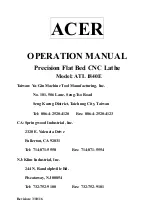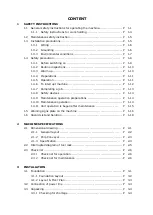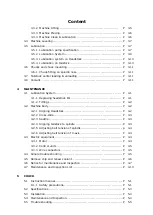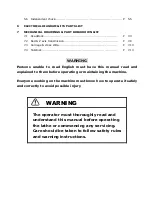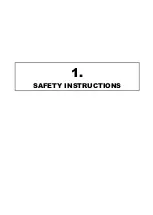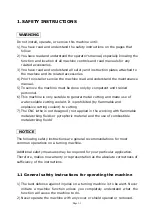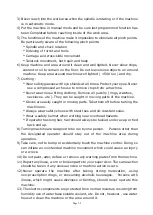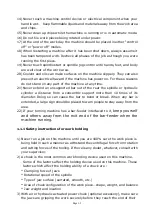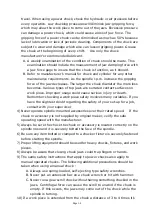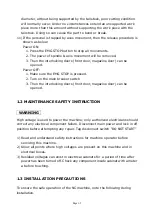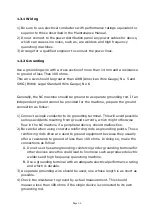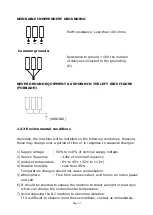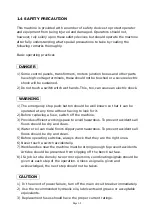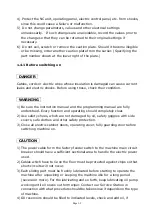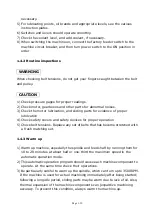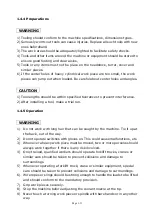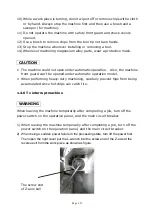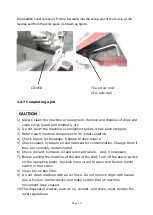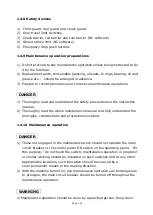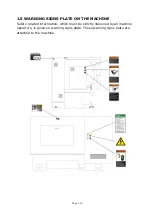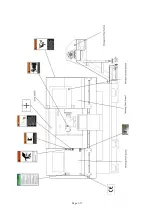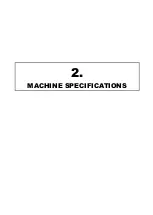
Page 1-4
travel. When using a power chuck, check the hydraulic or air pressure before
every operation. Low chucking pressures will diminish jaw-gripping force,
which may allow the work piece to come out of the jaws. Excessive pressure
can damage a power chuck, which could cause a loss of jaw force. The
gripping force of a power chuck can be diminished as much as 50% because
lack of lubrication or lack of periodic cleaning. Components of the chuck are
subject to wear and damage which also can lessen gripping power. Grease
the chuck at the beginning of every shift. Use only the chuck
manufacturer’s recommended lubricant.
A.
A weekly examination of the condition of chuck should be made. This
examination should include the measurement of jaw clamping force with
a jaw force gage to insure that the chuck is function, as it should.
B.
Refer to manufacturer’s manual for chuck and cylinder for any other
maintenance requirements. As the spindle r.p.m. increase the gripping
force of the jaw decreases. The larger the chuck diameter the more loss
becomes. Various types of top jaws are serrated contact surfaces on
work piece. Improper usage could cause serious injury or death.
Remember-chucking a work piece safely involves many variables. If you
have the slightest doubt regarding the safety of your set-up for a job,
consult with your supervisor.
4)
Never operate spindle-mounted accessories over their rated speed. If the
chuck or accessory is not supplied by original maker, verify the safe
operating speed with the manufacturer.
5)
Always be sure the chuck the chuck or accessory is located correctly on the
spindle nose and it is securely bolted the face of the spindle.
6)
Be sure any item bolted or clamped to a chuck or fixture is securely fastened
before starting the spindle.
7)
Proper lifting equipment should be used for heavy chucks, fixtures, and work
pieces.
8)
Always be aware that closing chuck jaws could trap fingers or hands.
9)
The same safety instructions that apply to power chucks also apply to
manual operated chucks. The following additional precautions should be
taken when using a manual chuck :
A.
Always use spring-loaded, self-ejecting type safety wrenches.
B.
Never put an extension bar on a chuck wrench or hit with hammer.
C.
Never run a gear scroll chuck without having something chucked in the
jaws. Centrifugal force can cause the scroll to unwind if the chuck is
empty. If this occurs, the jaws may come out of the chuck while the
spindle is turning.
10) If a work piece is extended from the chuck a distance of 3 to 4 times it’s
Summary of Contents for ATL 1820E
Page 5: ...1 SAFETY INSTRUCTIONS ...
Page 22: ...Page 1 17 ...
Page 24: ...2 MACHINE SPECIFICATIONS ...
Page 25: ...Page 2 1 2 MACHINE SPECIFICATIONS 2 1 Dimensional drawing ...
Page 27: ...Page 2 3 2 1 2 Chip Conveyor ...
Page 31: ...3 INSTALLATION ...
Page 34: ...3 1 2 Layout floor plan Following is a top view drawing ...
Page 43: ...4 MAINTENANCE ...
Page 55: ...5 CHUCK ...
Page 64: ...Page 7 3 7 1 HEADSTOCK 1 HEADSTOCK _ 18 SPINDLE BORE 58mm 2 ...
Page 65: ...Page 7 4 18 SPINDLE BORE 58mm 2 ...
Page 69: ...Page 7 8 7 2 BED Z AXIS TRANSMISSION ...
Page 71: ...Page 7 10 7 3 CARRIAGE CROSS SLIDE ...
Page 74: ...Page 7 13 7 4 TAILSTOCK MANUAL TAILSTOCK _ 18 ...

